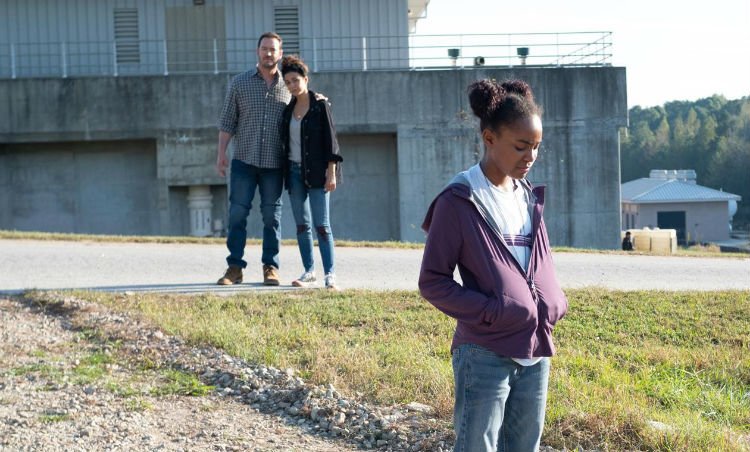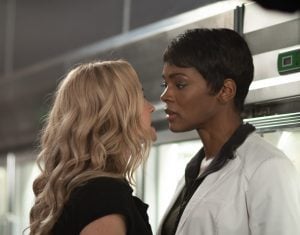
“The virus was the cure. It’s the cure for humanity and all of its imperfections.”
The question of what would you do to potentially save the world arises as Project Noah inexorably hurtles the world closer to the end as Amy battles with the escaped viral Winston, Lear comes to a decision, and Babcock’s past connection with Sykes is revealed.
If you’ve ever seen a car wreck—or one about to occur—then you know how hard it is to look away. Depending on the circumstances, the questions arise: how did this happen? Were they not paying attention? Was it the environment? Could any of it have been prevented? These are fair and normal inquiries and, so similar to the everyday car accidents, they can be proposed to the leadership of Project Noah. For the last few weeks, the danger represented by the virals has become more and more pronounced. It’s not just their enhanced strength, healing factor, or gluttonous thirst for blood that is concerning; it’s their psychic abilities to enter other people’s minds, to direct unwilling subjects to do their bidding that became the reddest of red flags. Still, Sykes and the others balked at Lear’s initial warnings that they need to consider termination. And now that the truth is out there—a viral bite can turn someone into a viral acolyte—it may already be too late.

It was only a matter of time before a viral escaped but Winston’s prison break was not in Fanning’s original plans, a truth the latter tells the sadistic escapee in no uncertain terms. Though we’ve seen Fanning interact with humans as well as Babcock and Carter on multiple occasions, this is the first time Fanning has been shown going mind-to-mind with any of the other Twelve. Winston’s actions have upset Fanning’s carefully crafted plan and the head viral isn’t happy about it. Granted, Winston’s jailbreak has identified Amy as the biggest threat to the virals’ plan. Not only does she seemingly possess all the same strengths as her viral cousins, but she has yet to exhibit any of the weaknesses (need for blood, sensitivity to sunlight). Then there’s here massive telekinetic scream/blast which saved Wolgast last week and left Winston running like a scalded dog. But she’s young and decidedly more vulnerable than if she were allowed to live, thus Fanning tasks his wayward viral with not only finding a way to return to the fold but to kill Amy beforehand.

Though much of “I Want to Know What You Taste Like” is a hunt for Winston, it also touches on themes of abandonment. A flashback to six months prior showcases the previously unknown bond formed between Sykes and Babcock where the two women found common ground with past suicide attempts. They even became friends…and yet, once Babcock mutated, that connection was severed. True, from everything the data told them, Babcock was just like the other virals—braindead (ish) with only the reflexive instinct to feed—but she didn’t see it that way. She confronts Sykes in her mindscape, not only calling the scientist out for leaving her but making sure Sykes knows that, when the time comes, Babcock will be coming for her.
And then there’s Amy. At the center of it all, she continues to develop her powers and becomes vital in the team’s search (and eventually putting down) Winston. Her abilities are growing exponentially but in that, the fact that she’s a kid could be easily lost. Her emotional battle with Wolgast is a part of that; the scars from losing her mother are still fresh and when she can’t find her copy of A Wrinkle in Time, that loss becomes more pronounced. Wolgast has his own crisis, terrified of losing Amy, feeling powerless as his own past scars (losing his daughter) rise closer to the surface. He becomes the classic ‘I’m yelling at you because I want to keep you safe but don’t know how’ parent while Amy can’t possibly understand why he’s so intense. In the end, they both find common ground but it’s coming to be a bit too late.
Finally, after absorbing the scope of danger the virals represent, Lear recruits Sykes to do what they should have done long ago: terminate the virals. Unfortunately, this is where the biggest reveal of the viral connection becomes known. It turns out that a viral progenitor has a psychic link to its offspring that, if the original is terminated, the progeny soon follow. This revelation blasts to the forefront when Lear, with Sykes help, moves to kill Fanning and the rest of the Twelve only to discover that everyone who has been injected with the serum—including his wife Elizabeth and Amy—will share the same fate as Fanning.
The Road Less Traveled
- There are several eye-rolling moments littered throughout the episode that takes it down a notch. Lila more or less delivered into Wolgast’s arms was so ridiculously convenient, it nearly overshadowed Guilder’s obvious move to take Wolgast off the board.
- So now that everyone seems to be on the “we shouldn’t just be following orders” train, it seems to be too little, too late. Richards finally tells Wolgast he’ll help them to escape, Sykes agrees with Lear to terminate the virals only to be stopped when they learn that her connection to Fanning will kill her should he die. In that, the real question becomes what are you willing to sacrifice? At the start of all this, Sykes was ready to potentially kill a little girl because she deemed one child’s life acceptable if it could save millions. Now that she knows Amy, will her philosophy change? The upcoming decision reminds me that, while it’s a noble sentiment from Captain America that “we don’t trade lives”, the truth of the matter is that sometimes the needs of the many indeed outweigh the needs of the few.
- Fanning’s continued evolution and subsequent plan is close to fruition. His belief that this virus is a “cure for humanity and all its imperfections” begs the question: is this an ideal born of Fanning’s own mind or has his mind been twisted by the exposure to the virus? On the one hand, the latter hypothesis makes sense but, after seeing the human Fanning, it could just as well be his own narcissistic arrogance at play.
![]()
